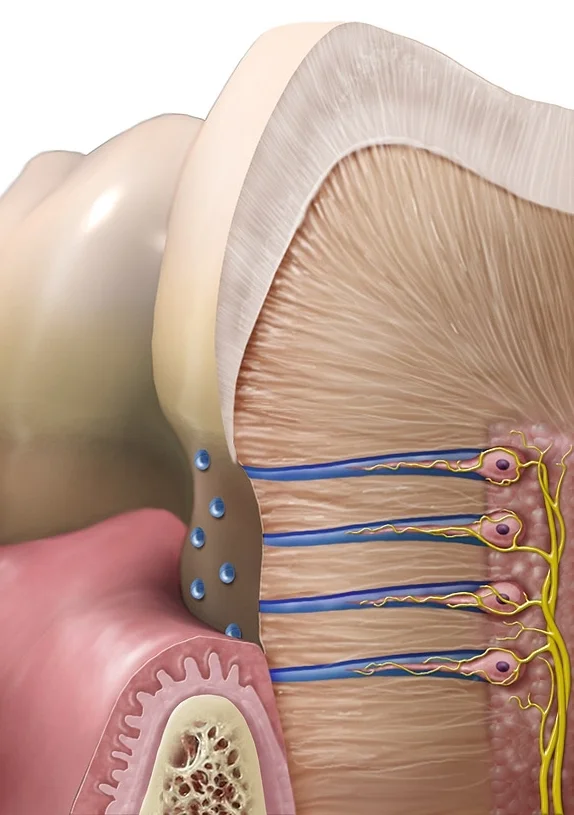What does it mean when you have sensitive teeth?
/Defining Tooth Sensitivity
Tooth sensitivity has several causes, including decay and trauma. However, the focus of this post is the type of tooth sensitivity I most often see: tooth sensitivity associated with exposed dentin. In this case, it is also referred to as dentin hypersensitivity. As you may recall from the 1st post, dentin is comprised of microscopic tunnels called dentinal tubules that extend from the pulp at the core of the tooth out to the dentin surface. These tubules are filled with fluid and also contain cellular processes (arm-like extensions of tooth cells that reside in the pulp).
Different stimuli cause fluid movement within the dentinal tubules and disturb the tooth cells and stimulate the nerve fibers in the pulp, resulting in the painful “zinging” or aching sensation. Cold, heat, sweet or acidic food/drink, and touch are examples of the stimuli responsible for dentin hypersensitivity.
What Causes Exposed Dentin?
Dentin becomes exposed due to a variety of processes involving gingival recession or loss of enamel associated with any (or a combination) of the following:
- Thin biotype (thinner, more delicate gum tissue) and thinner bone support
- Parafunctional habits (clenching and/or grinding your teeth)
- Periodontal disease and treatment
- Trauma
- Orthodontic therapy if it results in the teeth being moved to positions where the roots are not fully encased in the alveolar bone
- Oral piercing
- Traumatic toothbrushing
- Erosion
Managing Tooth Sensitivity
OTC Products: There are several ways to treat sensitivity associated with exposed dentin. The following desensitizing agents are in products available over-the-counter:
- Potassium nitrate
- Mechanism: dulls nerve sensation/sensitivity
- Product examples:
- Sensodyne toothpastes (except for Sensodyne Repair and Protect, which has stannous fluoride see below)
- Colgate Enamel Health Sensitivity Relief
- Crest Sensi Relief
- Tom’s of Maine Sensitive Teeth Natural Toothpaste
- Arginine
- Mechanism: occludes dentinal tubules
- Products:
- Tom’s of Maine Rapid Relief Sensitive
- Colgate Sensitive Pro-relief (currently only available online)
- Calcium oxylate salt
- Mechanism: occludes dentinal tubules
- Product: Crest Sensistrips (effect of a single 10 min application typically lasts for about 3 weeks)
- Stannous fluoride
- Mechanism: occludes dentinal tubules
- NOTE: stannous fluoride is well-known to cause staining of teeth
- Product examples:
- Crest Pro-Health
- Crest Sensi Repair and Prevent
- Sensodyne Repair and Protect
INSTRUCTIONS FOR THE ABOVE TOOTHPASTES:
Apply 2x daily and do not rinse after. You should start to notice a decrease in sensitivity after 1 week, with maximum benefit after 4 weeks. You must to continue to use it, however, as the sensitivity will most likely return upon discontinuation. Consult with your dentist if there are no positive effects after 4 weeks of twice daily use of the toothpaste.
Ingredients to Avoid
- Pyrophosphates: Pyrophosphates are an ingredient found in many toothpastes, especially in those labeled for “Tartar Control.” Pyrophosphates help decrease tartar buildup, however they have also been linked to sloughing of oral soft tissues, aphthous ulcers (canker sores), and dentin sensitivity. Many people do not experience soft tissue lesions with pyrophosphates, however if you suffer from dentin hypersensitivity, you may consider avoiding toothpastes containing them.
- Hydrogen peroxide Hydrogen peroxide is the active ingredient in tooth bleaching products and in some whitening toothpastes. It can cause tooth sensitivity separate from dentin hypersensitivity because it penetrates the enamel and dentin and reaches the pulp, causing some transient inflammation. If you already suffer from dentin hypersensitivity, hydrogen peroxide certainly has the potential to intensify your symptoms.
Professional treatment methods
If OTC methods are inadequate for managing your dentin hypersensitivity, there are also in-office treatment options to address your symptoms. Consult with us regarding your hypersensitivity so that we can determine which treatment options may be effective for you.






